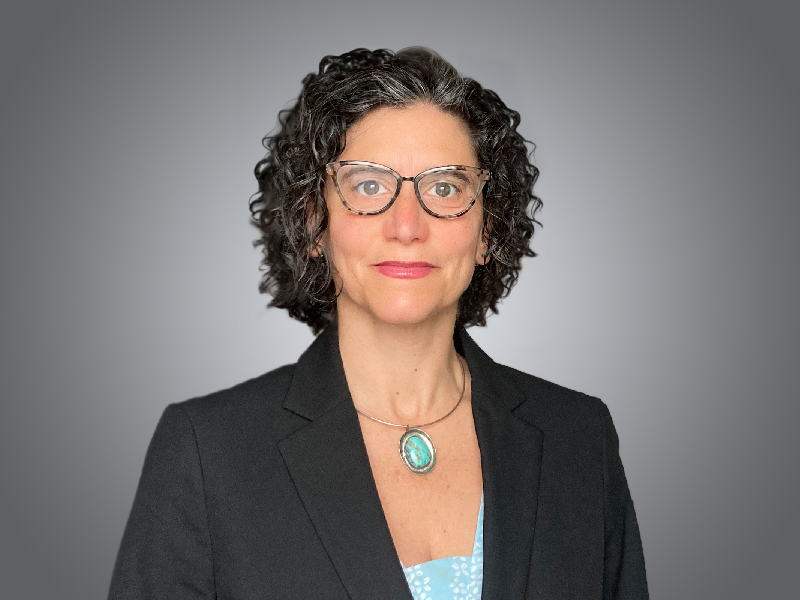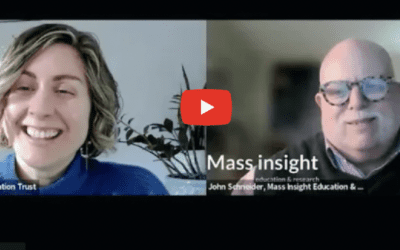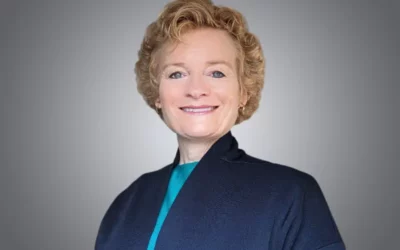Ms. Wolfe succeeds Dr. Susan Lusi, who will step down in June after leading the national nonprofit for eight years. April 18, 2024 – The Board of Directors of Mass Insight Education & Research has named Andrea Wolfe as the next President & CEO of the...
An Interview with Sarah Phillips—Our Director of Research and Impact
Dr. Sarah Phillips leads Mass Insight’s research and impact work. It is a new position that Mi created to help our team assess areas of strength and areas where we can improve in our work with schools, districts, and state education agencies. Sarah keeps us focused on continuous improvement and has helped us measure the impact of our work, an important component of Mi’s strategic plan.
I sat down with Sarah to talk to her about her work as well as her new role as a recently elected member of a local Massachusetts school committee. This interview has been edited and condensed.
John Schneider: Sarah, why don’t we begin with telling us about your job and responsibilities here at Mass Insight. What are you responsible for?
Sarah Phillips: I’m the director of research and impact. I think of my job as our organization’s internal evaluator, and I help us figure out if we’re having the effect on kids and schools that we want to and, if not, how we can change our work to get closer to the ideal than we are now.
JS: Why would an organization want to have someone on staff that’s looking at the effectiveness of its work, of its impact?
SP: I think very few people are able to hit a home run right out of the gate, and we all try things that don’t work as well as we think they could or should. Let me give you an example. When I was a kid I was a swimmer. And when I started out I was really bad. I was a backstroker, and it took me two minutes to swim 50 yards, which is all the way across the pool and back. I didn’t want to be the slowest kid in the pool, so I committed myself to learning my strokes and refining them and building my stamina. I made myself this sign that I hung in my room that said, “To be the best you have to beat the rest and to beat the rest you have to practice better than the best.” Looking back now, it seems totally goofy, but I said it to myself all the time during workouts. I owned it, and by the time I finished high school, I was the state champion multiple times over.
I think it’s the same way for organizations and program development. You have an idea based on the research and everything you’ve ever done. You think it’s going to work, but it never works exactly like you think it should. So, if you really want to have an impact on kids and you really want to have an impact on communities, then you need to look at what you’re doing critically and identify places where you’re falling short of your ideals and things you can do to constantly get better.
JS: You help Mass Insight think through strategies for continuous improvement. How would you define continuous improvement?
SP: I think it means that perfection is a goal that we’re all striving for, but we know we’re not always going to get there. So, we need to take an honest look at where we’re at and identify some things we can do to be more effective, try them out, see if they made a difference, and revise our plans to get closer to our goal.
JS: Let me shift gears a little bit and just talk about your background. You have your Ph.D. Where is your doctorate from?
SP: It’s from Brandeis, from the Heller school.
JS: What made you decide that you wanted to pursue a doctorate?
SP: I was the Service Director at City Year Rhode Island. We were running a variety of mentoring programs and afterschool programs and in-class support programs, and I was in charge of evaluation. And, you know, I did a really good job of coming up with measures that said we were having an impact on kids, but I didn’t know if we actually were. And that’s not to say anything about City Year at all, it’s just to say I didn’t have the skills to know if we were actually having a real impact. And I wanted the skills to figure that out. So, I went to get a Ph.D.
JS: And then after that where did you work?
SP: I worked for Tripod Education Partners, where I helped schools and districts better understand the teaching and learning environments in their schools. I did a lot of survey development work and a lot of assessing how well we were measuring the things we thought schools needed to know about. Like, were students feeling engaged in the classroom? Were teachers really feeling like the adults at their school took collective responsibility for students? And I did a lot of analyses for our partner schools and districts about the stories in their data. For example, one set of analyses looked at the relationships between Black and Latino students and their teachers in order to see if those relationships varied by whether their teachers were White or teachers of color. I did a similar set of analyses for another district about kids who identified as non-binary and really trying to understand how those kids had similar or different relationships with their teachers than kids who identified as solely male or solely female.
JS: You’ve really spent some time trying to unpack what some might call the secret sauce between the teacher and the student. You know, what makes that connection work or not work. What are some indicators that we should look at to see that there’s a connection happening between students and their teacher that is creating a really strong learning culture in that classroom?
SP: In my dissertation I did a bunch of interviews with kids to try to figure this out. And one of the things that kept coming up was care. Do kids feel like their teacher cares about them? But care has a cultural component, or an identity-related component, to it as well. So, if students are perceiving, you know, everyday racism coming from their teachers or they’re perceiving that their teacher isn’t fully inclusive of their gender identity, then that sense of care gets harmed. And then I think the other critical component of care is challenge, or as my mentor Ron Ferguson calls it, press. Does your teacher really want you to achieve? Is your teacher the kind of person who’s not going to rest until you are succeeding in school?
JS: And kids really pick up on that?
SP: Yes. I mean one of the things that I always think is really interesting, and it tends to come up more in conversations with kids of color, is that a caring teacher is a teacher who will not rest until I’m succeeding and who expects my very best all of the time. So, I think those two things—recognizing that care has a cultural component and that press is essential to care– are critical to creating the kind of student-teacher relationships that enable strong learning cultures to flourish.
JS: So, taking it beyond the classroom, how then does a school or a system support that kind of relationship so that the student believes that their teacher and the adults in the school really do care about their success?
SP: I think there’s a lot to it. I think the most basic ways that a district or a school can do that is by modeling the kind of relationships between administrators or central office staff and teachers that they want to see teachers have with their students. I think hiring is part of it, and screening for people’s relationship-building skills, particularly with students who are similar to the students that they’re going to work with. There’s lots of research that having a teacher of color is beneficial, for students of color as well as for White students, so finding ways to diversify our teaching force really matters. And then, you know, I think the basic continuous improvement cycle works just as well for relationship-building as for anything else you want to improve in a school or a district. And let me say one more thing that I probably should have put somewhere earlier in this list of things, is giving teachers the resources that they need to have strong individual relationships with students. When I was a seventh grade teacher, I had 37 kids in my class. I couldn’t fit 37 desks in my classroom, let alone give every kid the individual attention that they needed to demonstrate that a) I knew them well enough to care about them and b) I wasn’t going to rest until they were succeeding.
JS: I want to shift gears because you have an interesting side responsibility, and it’s a big responsibility. You were recently elected to the Somerville, MA School Committee. What drove you to want to become a member of the school committee?
SP: First of all, I’m a mom! I have a daughter who’s in third grade in one of the Somerville public schools, and I have a son who will be in kindergarten in two years. I want the best for my kids just like I want the best for all our kids. Second, I’m an activist. I was born in the women’s movement. Some of my earliest memories are skating away for the ERA and marching to Take Back the Night, so it’s kind of in my DNA to always be active in my community. When I moved to Somerville, a little over a decade ago, I got involved with the schools right away. I did a little work for the school committee then to help them think through ways to socioeconomically integrate the schools and that helped build momentum to put pre-K classrooms at a bunch of our elementary schools. I was really active in helping to stop a charter school in our community. I sat on the city’s Child and Youth Study Team. Until I got inaugurated, I sat on my daughter’s school’s school improvement council. So, to me, running for school committee was just an extension of the work.
JS: What do you think the school committee should do to support that student teacher relationship that you talked about earlier?
SP: I think two things that Somerville is doing and has already done, no thanks to me, that are helping to improve the student-teacher relationship are one, really making a huge investment in trying to hire more teachers of color and teachers who come from backgrounds similar to our students. The second piece is making sure that our staff are culturally responsive and our curriculum is culturally responsive. That helps enormously. Where I think we could go further is making sure our teachers have the resources that they need to meet the academic and social and emotional needs of all our students, because when you have 25 students in your classroom and the range of abilities is all over the place, you just can’t meet everybody’s needs. I think we have some phenomenal educators in our district, and we need to demonstrate that we care about them just as much as they care about our kids.
JS: Sarah thank you for joining us today.
SP: Thank you!

Recent Posts
Mass Insight Launches New Service to Tackle Chronic Absenteeism
The Targeted Intervention: Chronic Absenteeism will take a community-based exploratory approach to understanding the experiences of chronically absent students and efforts to increase student attendance. March 18, 2024 – Mass Insight Education & Research...
An Interview with Kristen Hengtgen of The Education Trust
https://youtu.be/1ZfxNShHJOU?si=d1a1GoVrgrDWT5Cu Kristen Hengtgen, Ph.D. is a senior analyst on The Education Trust's P-12 policy team and co-author of their new report, Increasing Access to Advanced Coursework in Massachusetts. In this interview, she joins Mass...
You may also like
An Interview with Kristen Hengtgen of The Education Trust
https://youtu.be/1ZfxNShHJOU?si=d1a1GoVrgrDWT5Cu Kristen Hengtgen, Ph.D. is a senior analyst on The Education Trust's P-12 policy team and co-author of their new report, Increasing Access to Advanced Coursework in Massachusetts. In this interview, she joins Mass...
Creating the conditions for greater success of systemically disadvantaged students in AP: Next steps for the Massachusetts AP STEM & English program
Recently the New York Times published an article entitled, Why is the College Board Pushing to Expand Advanced Placement? The article focuses on an important issue: there’s been greater growth in AP participation for Black and Latino students and students living in...
Recentering Our Communities in School Transformation: An Equity-First Approach
This is the final post in Mi’s Revisiting the Turnaround Challenge blog series. In Revisiting the Turnaround Challenge, we examined the outcomes of three “turnaround zones” implemented by urban public school districts in partnership with Mi between 2012-2019. Our goal...


